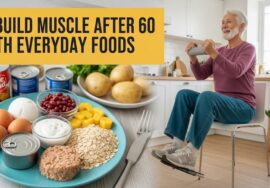Most people think of baking soda as just something for baking or cleaning, but for older adults, it can be much more useful. This ordinary white powder has been used for decades as a simple, low-cost home remedy. When used carefully, it can help with small daily discomforts that often come with aging.
If you are caring for an elderly loved one—or you’re a senior yourself—here’s how baking soda can be a gentle addition to daily life.
Table of Contents
- A Quick Look at Its Uses
- Soothing Heartburn Naturally
- Keeping Breath Fresh and Teeth Cleaner
- An Easy Denture Cleaner
- Relaxing Aching Feet
- Calming Dry or Itchy Skin
- Helping With Joint Stiffness (With Caution)
- A Natural Deodorizing Option
- 10 Questions Seniors Often Ask
- Safety Reminders for Older Adults
A Quick Look at Its Uses
Baking soda, or sodium bicarbonate, can:
- Calm mild acid reflux when taken occasionally
- Freshen breath and help with oral hygiene
- Keep dentures clean and odor-free
- Relax tired, swollen feet in a warm soak
- Ease mild skin irritation or itching
- Possibly support joint comfort when approved by a doctor
Always check with a doctor before using it regularly, especially if there are heart, kidney, or blood pressure concerns.
Soothing Heartburn Naturally
Older adults often deal with occasional heartburn, especially after eating heavy or spicy meals. Baking soda can offer quick relief because it balances excess stomach acid.
The simplest way to try it is by mixing half a teaspoon in a glass of warm water and sipping slowly. This is only for occasional use—too much baking soda can upset the stomach, and people with high blood pressure should avoid it unless a doctor says it’s safe.
Keeping Breath Fresh and Teeth Cleaner
Dry mouth and bad breath are common in seniors, especially for those taking multiple medications. Baking soda’s mild cleansing action helps neutralize odor and remove surface stains.
Make a soft paste by mixing a pinch of baking soda with a little water and brush very gently once or twice a week. Another option is to dissolve half a teaspoon in warm water and use it as a quick mouth rinse. Too much scrubbing can wear down tooth enamel, so use it sparingly.
An Easy Denture Cleaner
Dentures can sometimes hold odor, even with regular cleaning. Baking soda is a safe alternative to commercial denture cleaners.
Simply stir one teaspoon into a cup of warm water and soak dentures for 15–20 minutes. Rinse them thoroughly afterward before wearing them again.
Relaxing Aching Feet
Older adults who spend long hours sitting or standing often complain about sore or swollen feet. A baking soda foot soak can be surprisingly comforting.
Add two tablespoons to a basin of warm water and soak for about 15 minutes. Always dry feet well afterward. People with diabetes or circulation issues should ask their doctor before trying this.
Calming Dry or Itchy Skin
Skin can become drier and more sensitive with age. Adding baking soda to bathwater can help calm mild irritation.
Pour half a cup into a warm bath and soak for 10–15 minutes, then moisturize the skin afterward to prevent further dryness.
Helping With Joint Stiffness (With Caution)
Some wellness practitioners believe that slightly reducing body acidity can help ease stiff joints. Baking soda is alkaline, but it should only be used internally if a doctor approves.
If given the green light, mix a quarter teaspoon in a glass of water and drink it no more than a few times a week. This is not a treatment for arthritis—only a traditional home remedy some seniors find helpful.
A Natural Deodorizing Option
Body odor sometimes changes with age because of differences in sweat gland activity. Baking soda can be used as a mild natural deodorant.
Mix a little with water to form a soft paste, apply it gently under the arms, and rinse off after a few minutes. People with sensitive skin should test a small spot first.
10 Questions Seniors Often Ask
Q1: Can baking soda be taken every day?
A1: No, it should only be used occasionally and never without medical approval.
Q2: Is it safe for high blood pressure?
A2: Not unless a doctor approves, because it contains sodium.
Q3: Can it help arthritis pain?
A3: Some believe it helps by reducing acidity, but there’s no strong scientific proof.
Q4: Does it whiten teeth?
A4: It can gently remove surface stains but will not change natural tooth color.
Q5: How often can feet be soaked in baking soda?
A5: A few times a week is fine unless you have diabetes—then check with a doctor.
Q6: Is it safe for dentures?
A6: Yes, soaking dentures in a mild solution keeps them fresh and odor-free.
Q7: Can it help with bad breath?
A7: Yes, rinsing with a mild baking soda solution can neutralize odors.
Q8: Can it help with itchy skin?
A8: Yes, adding it to bathwater can soothe mild irritation.
Q9: What’s the safest way to use it?
A9: Occasional use for heartburn, oral care, and foot soaks is generally fine.
Q10: Can it really help with joint stiffness?
A10: Maybe, but only with medical guidance and not as a substitute for treatment.
Safety Reminders for Older Adults
- Talk to a doctor first before taking baking soda internally.
- Use occasionally, not every day.
- Be careful with sodium intake if you have heart or kidney issues.
- Test skin first if using as a paste or bath soak.








